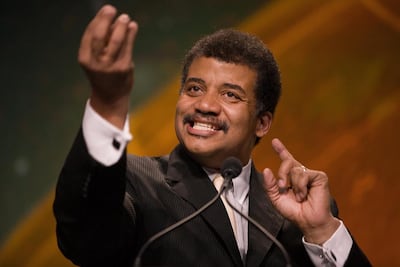Two world-renowned scientists have described colonising Mars to escape the climate change problem on Earth as "unrealistic".
British astrophysicist Martin Rees and American astrophysicist Neil deGrasse Tyson spoke on Wednesday during the second day of the World Government Summit, hosted by Dubai.
The duo disagreed with SpaceX founder Elon Musk and late physicist Stephen Hawking’s idea of using Mars as a backup planet.
Mr Musk is working towards sending a million people to Mars by 2050 using his Starship fleets. He hopes to send the first un-crewed cargo flight to the planet within this decade.
“Mars is a very hostile environment,” Mr Rees said. “What I certainly don’t buy is an idea espoused by Elon Musk and by my late colleague, Stephen Hawking, that we should expect that literally millions of people will go and settle on Mars as a way of escaping Earth problems.
“I think that's a dangerous delusion because dealing with climate change on Earth is a doddle compared to making Mars habitable.”
He said living on Mars is “no better than living at the South Pole, the ocean bed or on top of Everest”.
However, Mr Rees said he did believe that humans could be living on space stations in future.

The mysterious Red Planet
It is believed Mars was once very similar to Earth, but now it has a very thin atmosphere mostly made up of carbon dioxide, and is uninhabitable. Spacesuits and special habitats would be required.
Mr Tyson said terraforming Mars – changing the atmosphere enough to support life – would be needed to call the planet home, but it would be a huge task.
“If you want to do that [terraform Mars] to escape climate change and problems here on Earth, consider that whatever it takes to turn Mars into Earth, that's probably a bigger task than to turn Earth back into Earth.
“Both of us align in disagreement with Elon Musk and with the late Stephen Hawking on that.”
Climate change on Earth is caused by deforestation and fossil fuels releasing harmful gases into the atmosphere. This causes average temperatures to increase, the polar icecaps to melt and sea levels to rise. Another cause for concern is an increase in extreme weather patterns.
In 2017, the UAE also announced plan to build a human settlement on Mars by 2117.
However, space officials later said the main goal of the project was to help guarantee jobs in Stem (science, technology, engineering and mathematics) for the next 100 years.
Mr Rees also addressed space tourism, saying “it would never be safe” and should be called "space adventure" instead.
Several private firms are working on making space tourism flights possible, including SpaceX and Virgin Galactic. Japanese billionaire Yusaku Maezawa has signed on for the world’s first lunar tourism flight and will take eight civilians with him for free.
Plans for a space hotel and a commercial space station had also been announced.
“To go into space, there's never going to be a routine,” Mr Rees said.
“If this is done, I think it should be done by private players – then they're going to do it cheaper than Nasa or the European Space Agency, and they'll be taking the risk.
“If I was an American, I wouldn't support the manned space programme. It’s expensive because they have got to be so safe. They should leave it to people who are prepared for adventure and take risks.”
Mr Tyson, however, said space tourism could become safe one day, in a similar way to how aviation evolved.
“It's not hard for me to imagine the day when space adventure becomes so safe that you bring grandma and the kids, and no one is worried that you'll never come back,” he said.





























